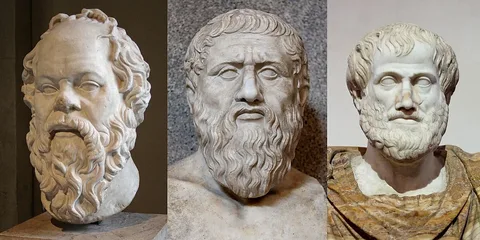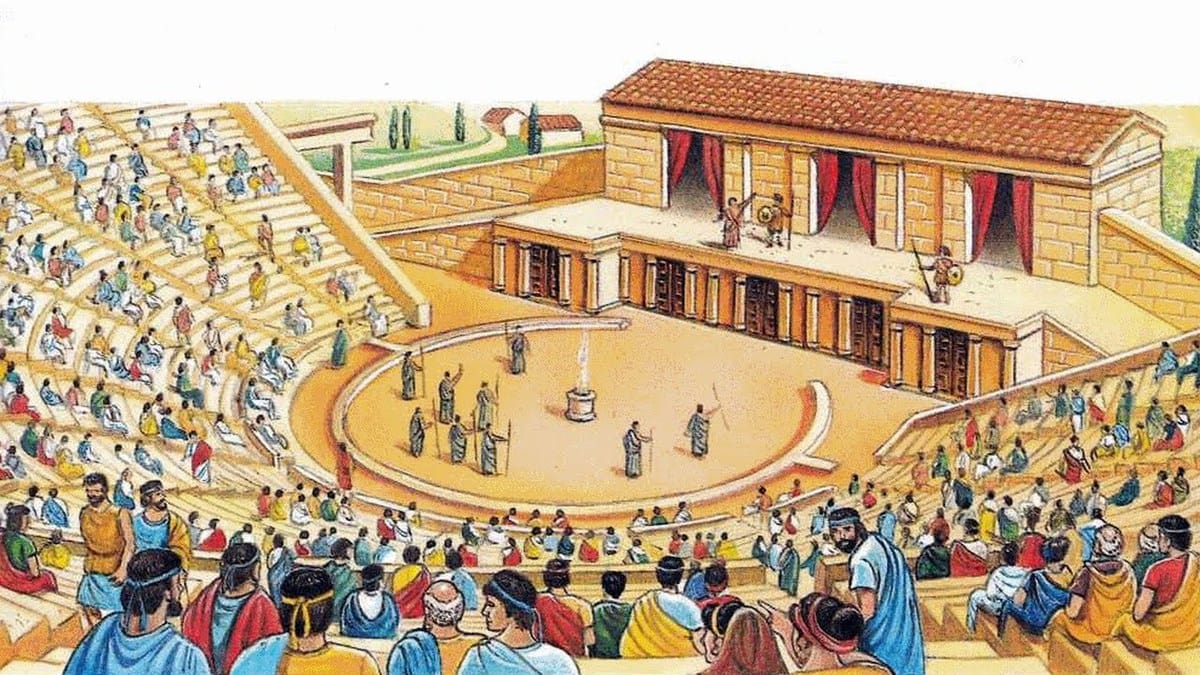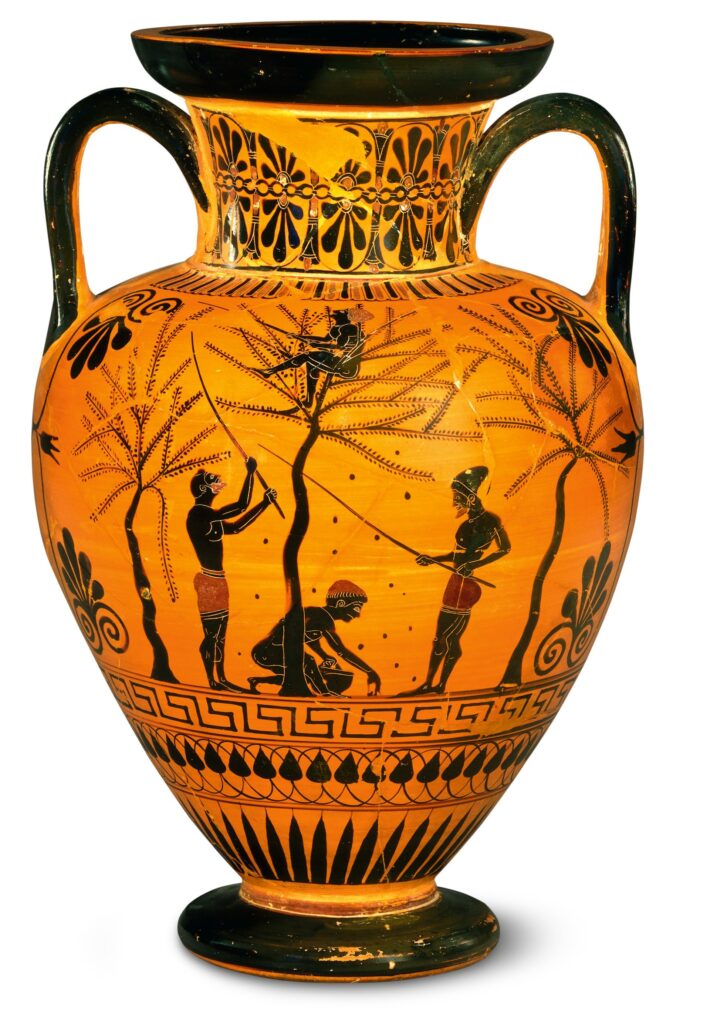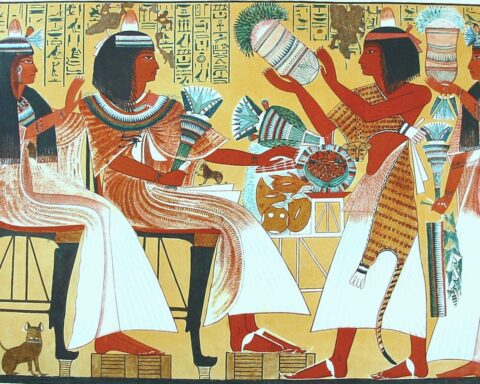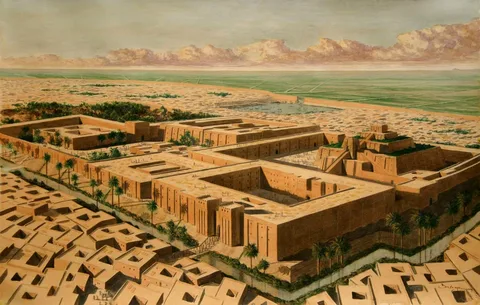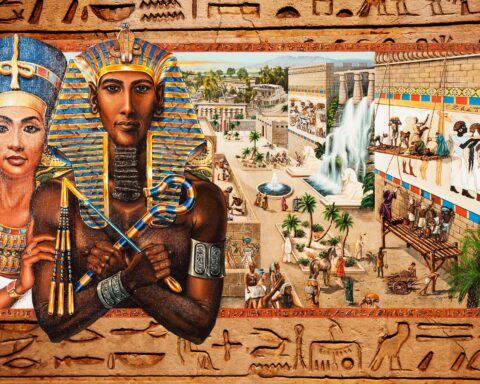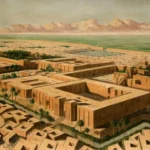Philosophy and Science
Influential Thinkers
The ancient Greeks are renowned for their profound influence on Western philosophy, science, arts, and politics. Their contributions have shaped the course of human civilization, leaving an indelible mark that continues to inspire and guide us today.
One of the most significant achievements of the ancient Greeks was the development of philosophy. From the pre-Socratics to the Hellenistic era, Greek philosophers such as Socrates, Aristotle, and Epicurus explored fundamental questions about existence, reality, ethics, and human nature.
The ancient Greeks made groundbreaking discoveries in science and mathematics, laying the foundations for modern scientific inquiry. Notable figures include:
- Pythagoras, who discovered the famous theorem that bears his name, revolutionizing geometry and mathematical understanding.
- Aristarchus of Samos, who proposed the first known heliocentric model of the solar system.
- Eratosthenes, who accurately calculated the circumference of the Earth and developed a method for determining distances between cities.
The ancient Greeks also made significant contributions to medicine. The physician Hippocrates is considered one of the most important figures in the history of medicine, as he emphasized the importance of observation, clinical documentation, and human anatomy. His teachings had a lasting impact on medical practices for centuries.
The ancient Greeks were renowned for their artistic achievements, which include:
- Sculpture:The iconic statues of the Greeks, such as the Venus de Milo and the Discobolus, exemplify the artistry and technical skill of Greek sculptors.
- Architecture: The Greeks developed the orders – Doric, Ionic, and Corinthian – which have been emulated for centuries in buildings around the world.
In politics, ancient Greece gave birth to democratic systems. Athens’ experiment with direct democracy, where citizens participated in decision-making processes, had a profound impact on Western politics. The works of Pericles, who played a key role in developing and implementing this system, remain influential to this day.
The influence of the ancient Greeks can be seen throughout history, shaping modern thought, art, science, and governance. Their contributions continue to inspire new generations of thinkers, artists, scientists, and leaders, reminding us that the ideas and achievements of the past are a vital part of our collective heritage.
Athens was home to some of the most influential philosophers in history, including Socrates, Plato, and Aristotle.
Athens is widely regarded as one of the cradles of Western philosophy, boasting a rich legacy of influential thinkers who shaped the course of human knowledge and understanding.
The city was home to Socrates (469/470 BCE – 399 BCE), a prominent figure in ancient Greek philosophy, known for his method of questioning, which is now referred to as the Socratic method. This approach involved asking a series of probing questions aimed at encouraging critical thinking and arriving at a deeper understanding of the subject matter.
Socrates’ most famous student was Plato (428/427 BCE – 348/347 BCE), who went on to establish the Academy in Athens, one of the earliest institutions of higher learning in the Western world. The Academy became a hub for philosophical inquiry and attracted students from all over the Mediterranean region.
Another prominent philosopher associated with Athens was Aristotle (384 BCE – 322 BCE), who studied under Plato at the Academy before going on to found his own school, the Lyceum. Aristotle’s vast body of work encompassed topics such as metaphysics, ethics, politics, and biology, among others.
Athens’ contribution to philosophy extends beyond these individual thinkers, however. The city was home to a vibrant cultural scene that fostered a sense of intellectual curiosity and encouraged the exchange of ideas. The famous Stoa, a public square in Athens where philosophers would gather to engage in discussions and debates, became an important hub for philosophical activity.
The legacy of these philosophers continues to influence contemporary thought, from the fields of ethics and politics to science and philosophy proper. Their work remains essential reading for anyone interested in understanding the development of Western philosophy and its continued relevance today.
Moreover, Athens’ significance extends beyond its role as a hub for ancient Greek philosophy. The city’s cultural achievements, including its contributions to theater, architecture, and the arts, have had a lasting impact on Western civilization.
In conclusion, Athens was home to some of the most influential philosophers in history, whose ideas continue to shape our understanding of the world and our place within it. The city’s legacy serves as a testament to the power of human curiosity and inquiry, inspiring future generations to pursue knowledge and wisdom.
Their ideas on ethics, metaphysics, and politics continue to shape Western thought.
The Ancient Greeks made significant contributions to various fields, including philosophy, science, art, and theater. Their ideas on ethics, metaphysics, and politics have had a profound impact on Western thought.
One of the greatest achievements of ancient Greek philosophers was their development of ethical theories. Socrates, Plato, and Aristotle laid the groundwork for many subsequent philosophical debates about morality and the human condition. For example, Socrates’ method of questioning, which has become known as the Socratic method, aimed to expose ignorance and encourage critical thinking.
The Greeks also made important contributions to metaphysics, the study of the fundamental nature of reality. Philosophers such as Parmenides and Plato proposed ideas about the universe’s underlying structure, including the concept of the “forms” or idealized abstract entities that underlie physical reality. These ideas influenced Western philosophy for centuries.
In terms of politics, ancient Greek city-states experimented with various forms of government, from monarchies to democracies. Philosophers such as Aristotle and Polybius wrote about the ideal form of governance and the role of citizens in a democratic society. The concept of citizenship and the importance of participation in public life were key themes.
The Greeks’ contributions to Western thought can also be seen in their emphasis on reason, critical thinking, and intellectual inquiry. They valued education and saw it as essential for personal development and civic engagement. This legacy has shaped Western philosophy and continues to influence contemporary debates about ethics, metaphysics, and politics.
Furthermore, ancient Greek art and architecture have had a profound impact on the development of Western aesthetics. The Parthenon in Athens is an iconic example of Doric architecture and has inspired countless imitations throughout history. Greek sculpture, particularly works by Phidias and Myron, showcased exceptional technique and emotional expression.
The Greeks’ achievements also extended to theater and performance arts. Playwrights such as Sophocles and Euripides wrote tragedies that explored complex themes and human emotions, while Aristophanes created comedies that poked fun at politics and society. These works continue to be performed and studied today.
Ancient Discoveries
The ancient Greeks were known for their remarkable contributions to various fields, including science, philosophy, arts, architecture, and governance. Their greatest achievements had a profound impact on the world, shaping Western civilization as we know it today.
One of the most significant Greek accomplishments was in the field of philosophy, particularly through the works of Socrates, Plato, and Aristotle. They laid the foundation for Western philosophy by questioning assumptions and seeking knowledge based on reason and evidence.
The Greeks also made groundbreaking discoveries in mathematics, with notable figures like Pythagoras, Euclid, and Archimedes. They developed the concept of pi (π) and formulated mathematical theories that still underpin modern mathematics.
In addition to their philosophical and mathematical contributions, the ancient Greeks excelled in the field of science, particularly in astronomy. They developed the geocentric model, which placed Earth at the center of the universe, and accurately calculated planetary orbits using astronomical observations.
The Greeks were renowned for their architectural achievements, with iconic structures such as the Parthenon and the Temple of Olympian Zeus in Athens. These impressive buildings showcased their mastery of engineering, design, and aesthetics.
Furthermore, the ancient Greeks made significant contributions to democracy, developing the concept of direct democracy through institutions like the Athenian Assembly. They also created laws that protected individual rights and promoted civic responsibility.
The impact of Greek achievements can be seen in modern society, from philosophy’s influence on Western thought to architectural styles that still inspire contemporary design. The cultural exchange between ancient Greece and other civilizations has shaped the world as we know it today.
The Ancient Greeks made significant contributions to mathematics, astronomy, and medicine.
The Ancient Greeks had a profound impact on various fields of study, particularly mathematics, astronomy, and medicine. Their discoveries and innovations significantly advanced the understanding of the world, laying the foundation for future generations.
In mathematics, the Ancient Greeks made substantial contributions to geometry, algebra, and number theory. They developed mathematical concepts such as pi, irrational numbers, and the Pythagorean theorem, which are still widely used today. Mathematicians like Euclid, Archimedes, and Pythagoras are renowned for their groundbreaking works in geometry.
The Ancient Greeks also made significant contributions to astronomy, mapping the night sky and identifying various celestial bodies. They developed models of the universe, including the geocentric model, which placed Earth at its center. Eratosthenes measured the Earth’s circumference with remarkable accuracy, while Hipparchus discovered the equinoxes and solstices.
Medicine was another area where Ancient Greeks made significant advancements. The physician Hippocrates is credited with laying the foundations of modern medicine. He emphasized the importance of observation, experimentation, and clinical trials in medical practice. Other notable figures like Galen and Aristotle contributed to the development of medical knowledge, including anatomy, physiology, and pharmacology.
The Ancient Greeks’ contributions extended beyond these fields. They made significant advances in philosophy, literature, art, architecture, and politics. Their works continue to inspire and influence contemporary thought, culture, and society.
They developed the concept of geometry and discovered that the Earth was round.
The ancient Greeks made significant contributions to various fields, including mathematics, philosophy, science, and art. In mathematics, they are credited with developing the concept of geometry, which laid the foundation for modern mathematics. Geometry is a branch of mathematics that deals with the study of shapes, sizes, and positions of objects. The ancient Greeks were able to accurately calculate the dimensions of geometric figures such as triangles, circles, and polygons.
The ancient Greeks also made significant contributions to philosophy. They are known for their development of Western philosophy, which includes the ideas of Socrates, Plato, and Aristotle. These philosophers explored fundamental questions about existence, reality, and knowledge. Their philosophical ideas have had a profound impact on Western thought and continue to influence modern philosophical debates.
The ancient Greeks also made significant contributions to science. They are known for their contributions to astronomy, medicine, and engineering. The ancient Greek philosopher Aristarchus of Samos proposed the first known heliocentric model of the solar system, which placed the Sun at the center of the solar system rather than the Earth. The ancient Greek physician Hippocrates is considered one of the fathers of medicine and developed the concept of the four humors.
Another significant contribution of the ancient Greeks was their discovery that the Earth was round. This idea challenged the prevailing view of a flat Earth and had a profound impact on our understanding of the world. The Greek philosopher Eratosthenes is credited with accurately measuring the circumference of the Earth, which provided evidence for the Earth’s roundness.
In addition to their contributions in mathematics, philosophy, science, and art, the ancient Greeks also developed the concept of democracy. The city-state of Athens was governed by a democratic system, where citizens had the right to participate in the decision-making process. This idea of democracy has had a profound impact on modern politics and continues to influence contemporary debates about governance and participation.
Finally, the ancient Greeks made significant contributions to literature and the arts. The works of Homer, Sophocles, Euripides, and Aristophanes are still studied and performed today. Their plays and poetry have had a profound impact on Western literature and continue to influence modern writers and artists.
In conclusion, the ancient Greeks made significant contributions to various fields, including mathematics, philosophy, science, art, democracy, and literature. Their ideas and discoveries continue to influence contemporary thought and remain relevant today.
Politics and Governance
The Birthplace of Democracy
The ancient Greeks are renowned for their significant contributions to Western civilization, but one of their most enduring legacies is the birthplace of democracy. The city-state of Athens, in particular, played a pivotal role in the development and implementation of democratic principles that have shaped governments around the world.
Democracy, derived from the Greek words “demos” (people) and “kratos” (power), was first established in ancient Athens in the 5th century BCE. This system of government, where power is held by the people either directly or through elected representatives, was a revolutionary concept at the time.
The concept of democracy in ancient Greece was not uniform across all city-states; however, Athens stands out as a pioneer in its development and execution. Under the leadership of notable figures such as Solon and Cleisthenes, Athenians implemented democratic reforms that empowered citizens to participate directly or through their representatives in governance.
Athenian democracy included several key features, including
Sortition: A process where citizens were randomly selected for public office, ensuring that positions of power were held by ordinary people rather than the wealthy few.
Direct Participation: Athenians could participate directly in decision-making through assemblies and council meetings, a radical departure from monarchies and aristocracies prevalent elsewhere.
Public Debate and Deliberation: The agora (marketplace) served as a central hub for discussion and debate among citizens on public matters, fostering an environment of free speech and civic engagement.
The democratic system in Athens was also notable for its checks on power. For instance
Separation of Powers: While the Athenian Assembly held legislative power, there were other branches that checked its authority, including the Areopagus (judicial) and the Boule (executive).
Accountability: Leaders were accountable to the people through regular elections and the ability for citizens to bring legal actions against officials.
The birthplace of democracy in ancient Greece, especially in Athens, had a profound impact on Western civilization. It inspired later forms of democratic governance throughout history, from the Roman Republic to modern democracies around the world.
This legacy extends beyond political institutions, too, influencing cultural and philosophical ideas about individual rights, citizenship, and participation in society.
The contributions of ancient Greeks, including their concept of democracy, serve as a testament to human ingenuity and perseverance. Despite being shaped by their social, economic, and environmental contexts, the ideals of democratic governance remain an essential part of human aspirations for equality, justice, and freedom.
Ancient Athens is credited with being the birthplace of democracy, where power was held by citizens rather than monarchs.
Ancient Athens is renowned for its significant contributions to the development of modern Western civilization, and one of its most enduring legacies is being credited as the birthplace of democracy.
Democracy, a system of governance where power is vested in the citizens rather than monarchs or other elites, was pioneered by the Athenians in the 5th century BCE.
The concept of democracy was initially met with skepticism and even hostility from some of the other city-states in ancient Greece, but it eventually spread to become a fundamental aspect of Athenian society.
The roots of Athenian democracy date back to the reforms introduced by Solon in 594 BCE, who established a system of government that allowed for greater participation by citizens in the decision-making process.
However, it was Cleisthenes who is credited with establishing the first democratic system of government in Athens in 508 BCE, through his reforms known as the “Cleisthenean Revolution”.
Cleisthenes divided the Athenians into ten tribes, each composed of citizens from all over Attica, rather than just the aristocratic families who had traditionally dominated Athenian politics.
This led to the creation of a more inclusive and representative system of government, where power was not held by a small elite but was distributed among a wider range of citizens.
The direct democracy of Athens is often contrasted with other forms of governance in ancient Greece, such as oligarchy (rule by a few), tyranny (absolute rule by one person), and monarchy (rule by a single monarch).
Athenian democracy was characterized by the principle of isonomia (equality before the law) and isēgoria (the right to speak freely in the assembly), which allowed citizens to participate directly in decision-making processes through the Assembly and the Courts.
The Assembly, composed of all male citizens, met regularly to debate and vote on laws and policies, while the Courts, also composed of citizen-jurors, tried cases involving crime and civil disputes.
This system of direct democracy was further reinforced by the development of institutions such as the Athenian Navy and the hoplite army, which required the active participation and commitment of citizens in defending Athens against external threats.
Ancient Athens’ greatest achievements in language, including the invention of the alphabet, the creation of lyric poetry, and the development of philosophical thought, also reflect the values of democracy and civic engagement that characterized Athenian society.
From the works of great poets like Sappho and Pindar to the philosophical musings of Plato and Aristotle, Athens’ literary and intellectual output was shaped by its commitment to free speech, critical thinking, and public participation in governance.
The legacy of ancient Athens continues to influence modern democracy, inspiring civic engagement, activism, and a deep commitment to individual rights and freedoms that are still fundamental to Western societies today.
The concept of citizenship and the rule of law were developed during this time.
The ancient Greek city-states, which flourished from around 800 to 146 BCE, made significant contributions to various fields, including politics, philosophy, theater, and the arts. One of their most enduring legacies is the concept of citizenship and the rule of law.
In ancient Greece, citizenship was a privilege reserved for free-born males who were born within a particular city-state or its surrounding territories. This meant that they had certain rights and obligations, such as participating in the assembly (ekklēsia) to make decisions on governance and laws, serving in the military, and paying taxes.
The concept of citizenship was closely tied to the idea of the “polis” (city-state), which was seen as a self-governing community that existed for the benefit of its citizens. The ancient Greeks believed that individuals had a duty to contribute to the well-being of their city-state, and in return, they were protected by its laws and institutions.
The rule of law, which holds that no one is above the law and that everyone is equal before it, was also an important concept in ancient Greece. The Athenians, for example, believed that the law should be based on reason (logos) rather than personal whims or biases. This idea was reflected in their system of governance, where laws were codified and applied equally to all citizens.
One of the most notable examples of the rule of law in ancient Greece is the Athenian concept of “dike” (justice), which emphasized the importance of fairness and impartiality in resolving disputes. The Athenians believed that justice should be based on the principles of equality, proportionality, and reason, rather than personal interests or power.
The development of these concepts had significant implications for Western philosophy and politics. The idea of citizenship and the rule of law influenced later philosophers such as Aristotle and Cicero, who built upon the ideas of their predecessors to develop more sophisticated theories of governance and justice.
In addition, the ancient Greek concept of citizenship has inspired modern democratic systems, where citizens have a range of rights and responsibilities, including participating in elections, paying taxes, and respecting the laws and institutions of their country. While the specifics of citizenship and governance have evolved over time, the core principles of the ancient Greeks – that individuals should be treated with dignity and respect, and that justice should be based on reason and fairness – remain an enduring part of our collective heritage.
Ancient Greek City-States
Ancient Greece was a collection of city-states that existed from around 800 BCE to 146 CE. These city-states were often at odds with one another, but they shared a common culture and achieved many great things that had a lasting impact on Western civilization.
The most well-known ancient Greek city-states include Athens, Sparta, Corinth, Thebes, and Argos. Each of these cities was an independent entity with its own government, laws, and traditions. However, they all shared a common culture and language, known as Ancient Greek, which was spoken throughout the region.
Ancient Greece made significant contributions to various fields, including philosophy, theater, architecture, art, mathematics, astronomy, medicine, and democracy. These achievements have had a lasting impact on modern Western society and continue to influence contemporary culture, politics, and technology.
Philosophy was one of the most influential Greek contributions. Ancient Greeks such as Socrates, Plato, and Aristotle made groundbreaking discoveries about ethics, metaphysics, epistemology, and other branches of philosophy that laid the foundation for Western philosophical thought.
Theater also played a significant role in ancient Greece. Tragedy and comedy playwrights like Sophocles, Euripides, Aristophanes, and Menander created works that not only entertained but also explored complex themes and social issues. Greek tragedy and comedy have continued to shape the art of storytelling and have inspired countless adaptations throughout history.
Architecture was another area where ancient Greeks achieved greatness. The Parthenon in Athens is one of the most famous examples of Doric architecture, which became a model for architectural designs across the world. Greek architects such as Ictinus and Callicrates were celebrated during their lifetime for their innovative creations that combined functionality with aesthetics.
The arts also flourished in ancient Greece, producing iconic works like the Venus de Milo statue and the Elgin Marbles. Sculptors like Phidias and Myron created masterpieces that showcased human beauty, emotion, and movement. The art of mosaic making was developed by Greek artists who used it to depict stories from mythology and everyday life.
Mathematics saw significant advancements in ancient Greece, particularly with the works of Pythagoras and Euclid. They made important discoveries about geometry, algebra, and number theory that helped lay the groundwork for calculus, topology, and other branches of mathematics.
Astronomical observations by ancient Greeks like Eratosthenes, Hipparchus, and Ptolemy led to accurate measurements of the Earth’s circumference, solar eclipses, and planetary movements. Their theories about the celestial bodies laid the foundation for modern astronomy.
The medical field in ancient Greece was also incredibly advanced. Physicians like Hippocrates and Galen made significant contributions to our understanding of human anatomy, disease prevention, and treatment methods. The Hippocratic oath, which remains an essential part of a doctor’s code of ethics today, originated from Hippocrates’ teachings on the importance of compassion and integrity in medical practice.
Finally, ancient Greece is often credited with inventing democracy. This system of governance allows citizens to participate directly or indirectly in decision-making processes through free elections and representative bodies like assemblies and councils. The concept of democracy has evolved significantly since its origins but remains a cornerstone of modern Western politics.
Ancient Greece was composed of city states, each with its own government and laws.
The concept of the polis or city-state was a fundamental aspect of Ancient Greek society, with each state enjoying a considerable degree of autonomy. This decentralized system allowed for a diverse range of governments to emerge, including monarchies, oligarchies, and democracies.
The most famous example of an Athenian Democracy
is that of ancient Athens, which flourished from around 500 BCE until the death of Alexander the Great in 323 BCE. In Athens, citizens had the right to participate in government through direct democracy, where they could vote on laws and policies.
The laws of Ancient Greece varied between city-states, but many shared a common ethos. Laws often dealt with property rights, contracts, and social hierarchies. The concept of justice was also crucial, with an emphasis placed upon retributive justice as well as restorative justice.
Ancient Greek contributions to language are numerous, including the invention of the alphabet, which consisted of twenty-four letters. This innovation allowed for written communication and facilitated the dissemination of knowledge across the Mediterranean world.
The Greeks made significant advancements in various fields such as philosophy (Socrates, Plato, Aristotle), theater (Tragedy and Comedy), art (Marbles of the Gods) , sports, architecture (Doric, Ionic, Corinthian orders) and astronomy ( Eratosthenes’ calculation of the Earth’s circumference).
Some of these city states, such as Sparta and Thebes, had different systems of governance compared to Athens.
One of the key differences between city-states was their system of governance. Sparta, for example, was a militarized oligarchy where power rested with two kings and a group of five ephors who served as executives. The Spartan government also included a council of elders known as the gerousia. This system allowed for a more efficient administration of military affairs and gave greater stability to the state.
Thebes, on the other hand, was an aristocratic oligarchy where power rested with the landowners or nobles. Unlike Sparta, Thebes did not have a strict code of laws like the Spartans’ Lycurgan laws. Instead, it had a more relaxed system of governance that allowed for greater flexibility and adaptability to changing circumstances.
Athens, as we know, was a direct democracy where power rested with the citizens who participated in the Assembly. Unlike Sparta’s militarized oligarchy and Thebes’ aristocratic oligarchy, Athens had no standing army, relying on its allies and mercenaries to provide military support when needed. This unique system allowed for more participation and engagement among citizens and fostered a sense of civic responsibility.
Despite these differences in governance, city-states like Sparta and Thebes did share some similarities with Athens in terms of their contributions to ancient Greek culture. For example, Sparta’s rigorous educational system known as the agoge produced some of the most skilled warriors in ancient Greece, while Thebes was renowned for its poets and musicians. Meanwhile, Athens contributed significantly to philosophy, theater, and democracy.
It is worth noting that these city-states had different economic systems as well. Sparta, for example, relied on its vast agricultural lands and slave labor force to produce food and other essential goods, while Thebes’ economy was more based on trade and commerce. Athens, as we know, also had an extensive maritime empire that allowed it to engage in international trade.
Arts and Culture
Theater and Performance
The ancient Greeks made significant contributions to theater and performance, shaping the course of Western drama and influencing modern theater practices.
Their greatest achievements can be seen in three main areas: the development of tragic and comedic forms, the creation of iconic characters, and the establishment of theater festivals and competitions.
Tragic Forms: The ancient Greeks developed two main types of tragedy: Aeschylean tragedy and Euripidean tragedy. Aeschylus’ plays are characterized by their complex plot structure, philosophical themes, and use of chorus, while Euripides’ plays focus on character-driven drama and the human condition.
Comedic Forms: Ancient Greek comedy emerged as a separate genre, with playwrights like Aristophanes creating farces that poked fun at politics, society, and culture. These plays often featured stock characters, satire, and absurdity.
Iconic Characters: The ancient Greeks created some of the most enduring characters in literature. For example: Oedipus, who exemplifies the tragic hero; Antigone, who embodies moral courage; and Dionysus, the god of wine, fertility, and theater, whose cult influenced the development of Western drama.
Theater Festivals and Competitions: The ancient Greeks hosted major festivals like the City Dionysia in Athens and the Lenaia in Athens, where plays were performed for prizes. These events brought together writers, actors, musicians, and artists to showcase their talents, promoting creative innovation and artistic growth.
The legacy of ancient Greek theater can be seen in subsequent Western drama, from Shakespeare’s use of tragic heroes to Molière’s comedic parodies. The Greeks’ contributions to the development of performance art continue to inspire modern theater practices, making them one of the most influential cultures in the history of world theater.
Greek tragedy and comedy were born during this time period.
The 5th century BCE was a pivotal moment in ancient Greek literature, marked by the emergence of two distinct dramatic forms: tragedy and comedy. This era saw the birth of some of the most iconic works of Western drama, including the tragedies of Aeschylus, Sophocles, and Euripides, as well as the comedies of Aristophanes.
Tragedy, a genre characterized by its exploration of human suffering and the fall of heroes, was deeply rooted in ancient Greek culture. The Greeks believed that tragedy allowed them to confront and understand their own mortality, and that it served as a warning against the dangers of hubris (excessive pride) and ignorance.
The earliest surviving tragedies date back to the late 6th century BCE, with Aeschylus’s “The Persians” being one of the first recorded examples. However, it was during the Golden Age of Athens, under the leadership of Pericles in the mid-5th century BCE, that tragedy truly flourished.
Tragedy’s popularity can be attributed to its ability to provide a cathartic experience for the audience, allowing them to purge their emotions and temporarily forget about the hardships of everyday life. This emotional release was made possible through the use of dramatic irony, where characters’ actions were often at odds with the audience’s understanding of what would ultimately occur.
Comedy, on the other hand, emerged as a distinct genre later in the 5th century BCE, with Aristophanes being its most famous exponent. Comedy focused on mocking and satirizing societal norms, politics, and cultural values. By using irony, farce, and absurdity, comedies allowed the ancient Greeks to comment on and critique their own society.
One of the key features of Greek comedy is its use of stock characters, such as the clever slave or the boorish aristocrat. These archetypes served as a way for playwrights like Aristophanes to explore various themes and ideas in a humorous yet incisive manner.
The works of Aeschylus, Sophocles, Euripides, and Aristophanes continue to be performed and studied today, offering insights into the values, beliefs, and culture of ancient Greece. Their influence can be seen in the development of subsequent literary genres, from Elizabethan tragedy to modernist drama.
Through their exploration of human nature, morality, and societal norms, Greek tragedians and comedians created works that have stood the test of time, offering timeless wisdom and universal themes that remain relevant today. Their masterpieces continue to inspire new generations of artists, writers, and thinkers, ensuring their enduring place in the canon of Western literature.
In conclusion, the emergence of tragedy and comedy during this era marked a significant turning point in ancient Greek literature, allowing them to explore complex ideas, emotions, and themes that were both reflective of their own society and universally applicable. Their works have had an enduring impact on the development of drama and continue to be studied and performed today.
The works of playwrights like Sophocles and Aristophanes are still studied today.
The works of ancient Greek playwrights, such as Sophocles and Aristophanes, continue to be widely studied and admired today. Their plays are not only considered masterpieces of literature but also provide a unique window into the culture, politics, and society of ancient Greece.
Sophocles
is often regarded as one of the greatest tragedians of all time. His plays, such as Oedipus Rex, Antigone, and Philoctetes, explore complex themes and emotions, showcasing his mastery of dramatic language and technique.
Sophocles’ plays often dealt with the human condition, probing questions about morality, justice, and the nature of humanity. His characters were multidimensional and nuanced, reflecting the complexities of ancient Greek life and values.
Aristophanes, on the other hand, was a comedic genius known for his witty satire and sharp social commentary. His plays, such as The Clouds and Lysistrata, poked fun at contemporary issues like politics, education, and war.
Aristophanes’ comedies often used absurdity and irony to critique the excesses of Athenian society and politics. His works continue to delight audiences with their clever wordplay, ridiculous characters, and timeless commentary on human nature.
Today, scholars and performers alike study the plays of Sophocles and Aristophanes for their literary merit, historical significance, and enduring relevance. The themes and ideas explored in these ancient works remain surprisingly relevant to modern life, making them a valuable resource for understanding ourselves and our place in society.
Some of the key reasons why the works of Sophocles and Aristophanes continue to be studied include:
- Cultural significance: Their plays offer a unique window into ancient Greek culture, revealing aspects of life, politics, and social norms that are both fascinating and instructive.
- Literary merit:Sophocles and Aristophanes were masterful writers who pushed the boundaries of language, structure, and character development in their plays.
- Timeless themes: The works of Sophocles and Aristophanes explore universal themes and ideas that continue to resonate with audiences today, such as morality, justice, and human nature.
- Theory and influence:Their plays have influenced countless writers, artists, and thinkers throughout history, making them a valuable resource for understanding the development of Western literature and culture.
In conclusion, the works of Sophocles and Aristophanes remain essential reading for anyone interested in classical literature, ancient Greek culture, or the human experience. Their plays continue to captivate audiences with their timeless themes, literary merit, and historical significance, making them a vital part of our shared cultural heritage.
Ancient Greek Art
Ancient Greek art is renowned for its enduring influence on Western cultural heritage. It emerged during the 8th century BCE, flourishing through various periods including Archaic (c. 800-500 BCE), Classical (5th and 4th centuries BCE) and Hellenistic (3rd and 2nd centuries BCE). Greek art is characterized by its emphasis on proportion, balance, harmony and idealized forms.
The greatest achievements of the Ancient Greeks can be attributed to their contributions in various fields. Firstly, they pioneered significant architectural innovations, as evidenced in iconic structures like the Parthenon (447-432 BCE) at Athens, showcasing Doric and Ionic orders with distinctive columns and ornate details. Greek architects skillfully incorporated natural elements, such as sunlight and ventilation, into building designs.
The Greeks were masters of sculpture, exemplified by masterpieces from Phidias’ workshop, including the colossal Athena statue (c. 447-432 BCE) housed within the Parthenon. This masterpiece depicts the goddess in full stature with contrapposto stance, highlighting perfect proportion and anatomical accuracy.
Greek art thrived under the patronage of wealthy elite who sponsored artists and architects. These patrons often commissioned works that told stories from Greek mythology and honored notable figures of history. As a result, art and literature became intertwined in Ancient Greece, exemplifying the concept of ‘synaesthesis.’
Another significant aspect of Greek artistic achievement lies in their mastery of painting, particularly vase painting. Famous potters like Euphronios (active c. 510-480 BCE) developed distinctive techniques to decorate pottery with intricate scenes from daily life and mythological tales.
The Ancient Greeks also pioneered the use of perspective and atmospheric effects in their paintings, such as those depicted on wall-paintings at Pompeii and Herculaneum. Their artistic innovations allowed for greater realism and emotionality within their works.
Furthermore, Greek literature saw remarkable advancements during this period, with iconic poets like Homer (8th century BCE) contributing epic masterpieces to the literary canon. This rich cultural heritage has inspired countless adaptations, translations, and artistic interpretations across centuries.
The enduring influence of Ancient Greek art can be seen in many aspects of modern culture, from architectural styles to literature and artistic movements like Neoclassicism. Their legacy continues to inspire creative minds across various disciplines and age groups.
Greek art is renowned for its beauty and harmony, with iconic statues such as the Venus de Milo and the Discobolus.
Greek art is renowned for its exceptional beauty and harmony, which is a reflection of the philosophical ideals of balance and proportion that were prevalent during ancient Greek times.
The Venus de Milo, a marble statue depicting the goddess Aphrodite (also known as Venus in Roman mythology), is one of the most iconic examples of Greek art. Created between 130-100 BC, this stunning sculpture showcases the skill and craftsmanship of the ancient Greeks in creating lifelike figures that exude elegance and sophistication.
Another notable example of Greek art is the Discobolus, a bronze statue representing the discus thrower. This magnificent piece of art was created by Myron around 450 BC, during the Golden Age of Athens. The Discobolus embodies the ideals of ancient Greek beauty, with its perfect proportions and dynamic pose that capture the moment of tension just before throwing.
The art of ancient Greece is not limited to sculptures alone; it also encompasses paintings, pottery, architecture, and other forms of expression. However, it was in sculpture that they truly excelled, creating masterpieces that continue to inspire and awe us today.
One key aspect that contributed to the excellence of Greek art was their emphasis on proportion, harmony, and balance. They believed in adhering to strict rules, such as the Golden Ratio (phi), which dictated the proportions of their works. This resulted in sculptures that were not only aesthetically pleasing but also imbued with a sense of order and rationality.
Another crucial factor was the development of innovative techniques and technologies. Greek artists made significant advancements in metalworking, marble carving, and painting, allowing them to create intricate details and achieve greater realism in their art.
Greek art is more than just a reflection of ancient beauty; it also provides valuable insights into the culture, values, and ideals of the people who created it. It reflects the importance they placed on athletics (as seen in the Discobolus), the idealized female form (Venus de Milo), and their reverence for nature.
The art of ancient Greece has left an indelible mark on Western culture, influencing countless generations of artists and shaping the course of artistic expression. As we continue to marvel at the beauty and craftsmanship of these iconic statues, we are reminded of the enduring power of art to transcend time and connect us with our shared human experience.
Their pottery and architecture also demonstrate a high level of skill and craftsmanship.
The ancient Greeks are renowned for their impressive contributions to the world of pottery and architecture, which demonstrate a high level of skill and craftsmanship.
Pottery was an essential art form in ancient Greek culture, with artisans creating exquisite vessels that showcased their mastery over various techniques such as red-figure, black-figure, and white-ground painting. The most famous examples include:
- Black Figure Vases:These vases feature black silhouettes of figures against a red or yellow background, often depicting scenes from mythology, daily life, or battles.
- Red Figure Vases:In contrast, these vases feature red outlines with white backgrounds, creating a striking visual effect and highlighting the subtle nuances in figure detail.
- White Ground Pottery:Characterized by intricate designs painted on a pure white background, often using metallic oxides to achieve colors, this style showcases exceptional skill and attention to detail.
The ancient Greeks also excelled in architecture, which played a vital role in the development of Western building styles. Notable examples include:
- Parthenon in Athens:A stunning example of Doric order, this temple is considered one of the greatest architectural achievements in history, embodying both functional and artistic perfection.
- The Theater at Epidaurus:Famous for its exceptional acoustics, this ancient theater demonstrates a harmonious blend of architecture and engineering, allowing spectators to experience an unparalleled level of auditory clarity.
- Hellenistic Tombs in Lycosura:Intricately designed tombs showcasing the expertise of Hellenistic architects, these structures provide valuable insights into ancient burial customs and cultural practices.
In conclusion, ancient Greek pottery and architecture represent a pinnacle of achievement in human creativity, technical skill, and artistic expression. Their influence can be seen throughout history, with numerous modern styles emerging from the foundational principles established by the ancient Greeks.
- Countries That Start With The Letter N - September 3, 2024
- Animals That Live In The Tundra - September 1, 2024
- Animals That Live In Madagascar - September 1, 2024

